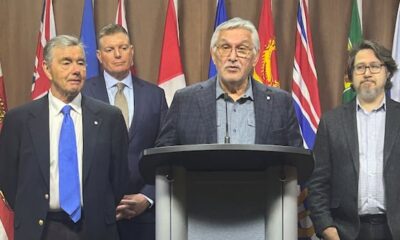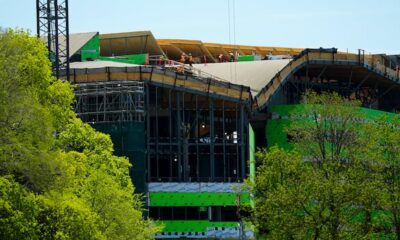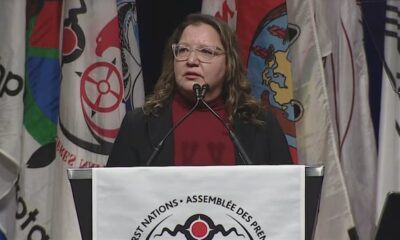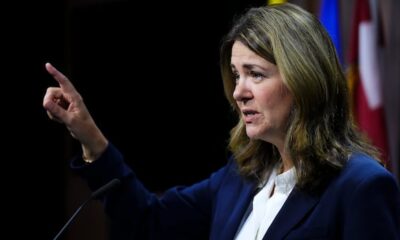Business
Ottawa Activists Urge Councillors to Reject Police Budget Increase
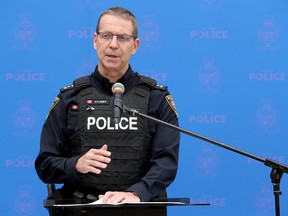
Community advocates in Ottawa are urging city councillors to reject a proposed increase to the police budget for 2024. Instead, they advocate for enhanced funding directed towards mental health resources, housing, and public transit. The call to action comes as Mayor Mark Sutcliffe unveiled the City of Ottawa’s budget plan, which includes a potential property tax increase of up to 3.75 percent and a significant budget rise of up to 6.5 percent for the Ottawa Police Service (OPS). If approved, this would mark the largest budget increase for the OPS in 15 years.
In his budget announcement on March 14, 2024, Sutcliffe emphasized the need for increased police funding, citing a recent city audit that highlighted staffing shortages within the force. He noted that residents have expressed a desire for improved public safety and more effective policing. “The police board has adopted a district policing model that will require more officers to be deployed throughout the community,” Sutcliffe stated. “We know the police have been under-resourced for some time.”
The proposed budget increase has faced immediate backlash from community activists, who argue that the funding should be redirected to address pressing social issues. Tom Ledgley of Horizon Ottawa criticized the increase as a “double standard,” asserting that the focus should not solely be on maintaining low taxes but rather on funding essential services. He pointed out that the OPS 2024 annual report indicated a 2 percent rise in the crime severity index, primarily driven by non-violent crime.
Ledgley emphasized that homelessness is a pressing issue that cannot be solved by increased policing. He suggested that funds could be better utilized for public transit, which is facing a $120 million deficit, and for affordable housing. The province’s housing ministry recently announced that Ottawa did not meet its housing targets and would not receive funding from the Building Faster Fund.
“There is a significant need for mental health supports,” Ledgley added. “Social services for marginalized individuals are crucial. I would like to see those mental health supports funded separately from the OPS budget.” Activists are particularly concerned about the implications of increased police funding for Black and Middle Eastern communities, which have historically expressed negative sentiments towards police.
According to the OPS 2024 Annual Use Of Force Report, racialized individuals represented 57 percent of all subjects involved in use-of-force incidents—an increase of 11 percent from the previous year. Notably, Black individuals comprised 26 percent of these incidents, despite making up only 8 percent of Ottawa’s population. Similarly, Middle Eastern individuals accounted for 20 percent of use-of-force subjects while representing 6 percent of the population.
Activist Robin Browne, co-founder of the 619-819 Black Hub, criticized the approach of increasing police funding as ineffective in addressing community safety. “When you throw money at the police, you’re not investing in the things that will truly make people safer, such as mental health supports and housing,” he stated. Browne urged the city to prioritize community resources, particularly culturally appropriate services for racialized populations, such as the Ottawa Black Mental Health Collective.
Research from the University of Maryland supports this viewpoint, highlighting that investments in community services like streetlights, mental health support, youth outreach, and public art can be as effective, if not more so, in enhancing safety in immigrant neighborhoods.
The OPS Chief, Eric Stubbs, defended the proposed budget increase, citing the growing complexity of policing needs due to population growth and rising call volumes. He acknowledged the necessity for additional resources but maintained that this should not come at the expense of police funding. “All of what I said equates to a lot of needing to be proactive instead of reactive,” Stubbs remarked in an interview with the Ottawa Citizen.
While Stubbs agreed that community resources should also receive funding, he argued that maintaining adequate police resources is essential for public safety. “There should be investment in those areas, but we have many challenges in what we’re trying to do, which is keep the community safe,” he said.
Browne raised concerns regarding whether the OPS has genuinely consulted with Black and Middle Eastern communities during its planning process. He questioned the effectiveness of diverse hiring practices, noting that despite increased diversity within the force, statistics still show disproportionate use of force against racialized groups.
The debate over the police budget increase in Ottawa highlights the ongoing tension between funding law enforcement and addressing systemic social issues. As city councillors prepare to vote on the proposed budget, the voices of community advocates continue to resonate, emphasizing the need for a more balanced approach to public safety and community well-being.
-

 Politics4 weeks ago
Politics4 weeks agoSecwepemc First Nation Seeks Aboriginal Title Over Kamloops Area
-

 World5 months ago
World5 months agoScientists Unearth Ancient Antarctic Ice to Unlock Climate Secrets
-

 Entertainment5 months ago
Entertainment5 months agoTrump and McCormick to Announce $70 Billion Energy Investments
-

 Science5 months ago
Science5 months agoFour Astronauts Return to Earth After International Space Station Mission
-

 Lifestyle5 months ago
Lifestyle5 months agoTransLink Launches Food Truck Program to Boost Revenue in Vancouver
-

 Technology3 months ago
Technology3 months agoApple Notes Enhances Functionality with Markdown Support in macOS 26
-

 Lifestyle3 months ago
Lifestyle3 months agoManitoba’s Burger Champion Shines Again Amid Dining Innovations
-

 Top Stories2 months ago
Top Stories2 months agoUrgent Update: Fatal Crash on Highway 99 Claims Life of Pitt Meadows Man
-

 Politics4 months ago
Politics4 months agoUkrainian Tennis Star Elina Svitolina Faces Death Threats Online
-

 Sports5 months ago
Sports5 months agoSearch Underway for Missing Hunter Amid Hokkaido Bear Emergency
-

 Politics5 months ago
Politics5 months agoCarney Engages First Nations Leaders at Development Law Summit
-

 Technology5 months ago
Technology5 months agoFrosthaven Launches Early Access on July 31, 2025



